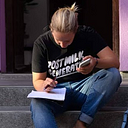Winter is coming, the first snowfall in Bosnia.
As the days get shorter and the nights get colder, the residents of Bosnia’s most beautiful region prepare for winter in the mountains. But for the thousands of refugees in the area, the freezing nights are an added peril to those they already face.
The region of Una Sana Canton, next to the border with Croatia, has become the unhappy home for thousands of refugees and migrants who remain trapped between war-torn homelands and the walls of the European Union. The more fortunate few reside in official camps, funded by the EU and administered by the International Organization of Migrants (IOM) — a related organisation of the United Nations. The camps range from isolated Sedra Camp where rooms are crowded and insects are found in the food, to Lipa Camp — 30 kilometres from the city of Bihać and with an intended capacity of 1000 people, tents with row upon row of bunkbeds fill all available space. It was already more than full to capacity when the buses arrived with the evicted residents of Bira Camp. Close to the city, there had been local opposition to this camp for some time, but it was with little warning to staff or police that the remaining residents, including unaccompanied minors and other vulnerable people, were bused to Lipa.
Yesterday, it began to snow. Those sleeping rough in the area, approximately 4000 people largely from Afghanistan, Pakistan, Bangladesh and North Africa, are routinely moved on by the police. Two abandoned buildings in Bihać provide minimal shelter and are subject to clearances multiple times a week. The police will come in the early hours of the morning and burn all the belongings they find. This has resulted in many people preferring to sleep in the fields and woods that surround the city. The ‘jungle camps’, collections of tents and tarps, are also raided and destroyed by the police, just less regularly than in the city. A refugee from Pakistan filmed as his tent went up in flames as his friends rushed to limit the damage. Head of IOM Peter Van der Auweraert tweeted on 9th October
“if #BiH state authorities don’t act soon, then 1000s of #migrants will spend winter in cold outside.”
The dire problems are recognised but the solutions are not forthcoming.
The growing right wing sentiment amongst the population has resulted in the government of Una Sana Canton gradually criminalising aid organisations that are trying to assist, especially those outside of camps. Performing First Aid is illegal, which is particularly needed when everyone has injuries that need tending to. The violence of the Croatian border guards is well known. Each time someone tries to cross the border into Croatia and is caught, they are subjected to beatings with batons and boots, robbed of all their possessions, and then illegally deported back to Bosnia — often and with increasing frequency, in only their underwear. The Border Violence Monitoring Network has collected reports that document different types of violence, including being forced to swim a dangerous river which has resulted in alleged deaths in recent weeks.
Winter can only make everything worse. It is now necessary to travel from Bihać to Italy without being caught in either Croatia or Slovenia — the authorities there illegally deny the basic right to request asylum. This journey equates to 12 or more days walking over mountains and through forests avoiding detection. Lack of food and water can often spell the end of a ‘game’ as it is referred to, but the increasing cold is going to prove a much more dangerous problem. A man from Afghanistan who sleeps in the biggest of the abandoned buildings said, “We cannot go back, our lives are in danger. We don’t want to be here and we don’t want to steal. But if they take everything from us, then what choice do we have?” There are some that have been pushed back dozens of times, each time robbed of their belongings and their dignity. Despite this treatment, refugees understand the position of the Bosnian people. A country that still has its own war of the 1990s to recover from is struggling under the weight of this added burden. With nearly 35% unemployment, it is understandable that resources feel stretched already. Small organisations like No Name Kitchen will provide what support they can, but with continuing uncertainty about government decisions and illegal police treatment, winter will be very long and cold for refugees in Bosnia.
